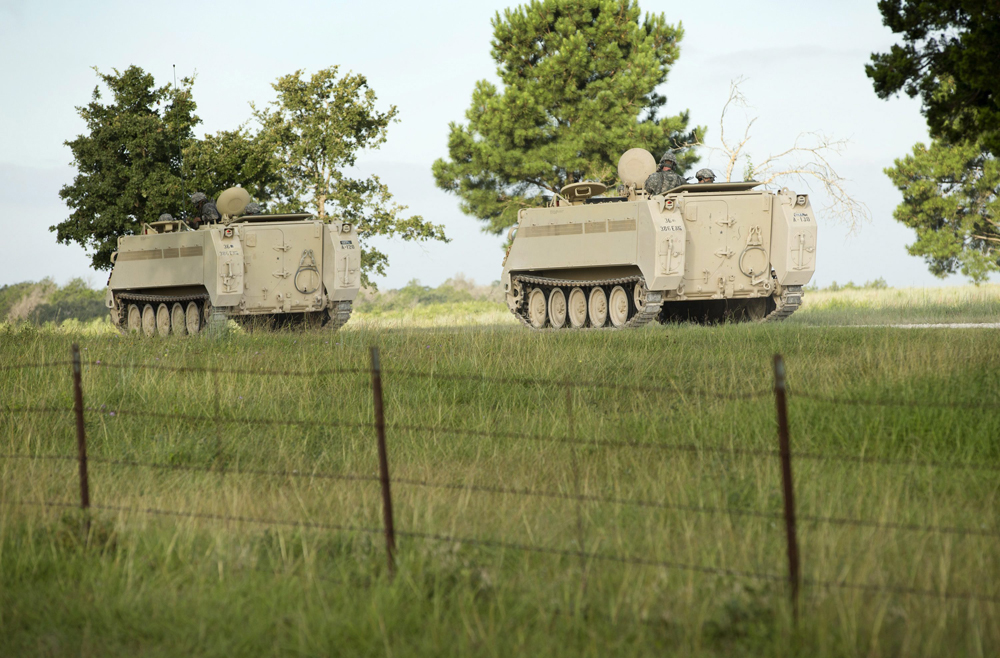U.S. president Barack Obama’s eight years in office kept the conspiracy theorists busy.

One prominent example: a strongly held belief that a military exercise in Texas called Jade Helm 2015 would in fact usher in the beginning of martial law.
“Over the course of 2015, the conspiracy theory became progressively more complicated and less coherent, with claims that Jade Helm was somehow linked to a spate of Walmart closures in Texas and other states, that civilians were being implanted with microchips,” Snopes explained. The Times said in 2015 that the fantasies “traverse the outer edges of political paranoia.”
This idea requires suspensions of disbelief at various points, including the concept that a serious attempt at military rule could be fended off by a small group of unarmed patriots with binoculars.
Nonetheless, Texas Gov. Greg Abbott ordered the state’s National Guard to “monitor” the exercise, first saying that they would ensure that Texans’ “safety, constitutional rights, private property rights and civil liberties will not be infringed,” but adding a few days later that the Guard would serve “as a communication facilitator between the Special Operations Forces and the people of the state of Texas and nothing more than that.”
The whole strange episode may seem like water under the bridge, except for a revelation by former CIA director Michael Hayden on Friday.
Hayden, appearing on MSNBC, said that Russian bots, along with existing extreme-right media, had a role in fueling the conspiracy theories. For the Russians, Abbott’s decision to involve the Guard – whatever their real role actually was – gave them the confidence to target the 2016 U.S. election.

Get breaking National news
“Russian bots and the alt-right media … convinced many Texans (the exercise) was an Obama plot to round up dissidents. It got so much traction that the governor of Texas had to call out the National Guard to observe the federal exercise to keep the population calm,” Hayden said.
“At that point, I’m figuring the Russians are saying, ‘We can go big time.’ At that point I think they made the decision, ‘We are going to play in the electoral process.'”
(Russia has tried to amplify separatist movements led by conservatives in Texas – the St. Petersburg-based Internet Research Agency operated the Heart of Texas Facebook page, which at the time Facebook took it down had half a million followers, more than the Texas Democratic and Republican Facebook pages combined. It it also linked to California separatists, who trend liberal. In any case, the Civil War set a precedent that no state can secede, so the debate is academic.)
In brief:
- Buzzfeed looks at how millions of people in Nigeria became convinced that a mass abduction of schoolgirls by Islamic militants was actually faked by the government. “Mix religion and partisanship and social media and you have a toxic brew that serves as culture medium for conspiracy theorizing,” one observer says.
- The Chronicle of Higher Education profiles Zeynep Tufekci, a University of North Carolina professor who has emerged as a must-read thinker about the complicated interaction between platforms like Facebook, politics and disinformation that we are just beginning to try to understand. “Who else but an independent academy is going to do what we can do?” she asks. “Instead of claiming that we as academics are relevant, we should show why we’re relevant.”
- Dublin-based CEO Gavin Sheridan (@gavinsblog) dissects what we can learn about who’s behind Facebook and YouTube social media campaigns related to Ireland’s abortion referendum. (Spoiler: not much.) However, forensics of this kind may be helpful in upcoming Canadian election campaigns, such as Ontario’s in June.
- Video of bombings (from the bomber’s point of view) often looks a bit like a video game. Poynter looks at how on Russian and Turkish TV, video purporting to be from combat often actually is from a video game.
- In The Intercept: a look at propaganda designed to confuse observers about responsibility for the 1937 bombing of Guernica during the Spanish Civil War (the Germans and Italians bombed the Spanish city, a test run for larger-scale air raids during the Second World War). It was successful in the short run: ” … many of the reporters who visited Guernica with Spanish fascists … duly filed reports casting the cause of its destruction as a possibly unsolvable mystery.” Robert Mackey draws a parallel to recent Russian and Syrian government attempts to deny responsibility for last month’s chemical attack in Douma.







Comments